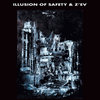Hm... by Mzk

Music is yet another art-form. It's all about making noise that doesn't displease people. Music is best recognized by your ears politely knocking on the door to the brain and saying
"Hi. Something's coming in - we think you ought to take a look at it."
Generation after generation people have been making music. Everybody knows what music is. But putting it in words sounds easier than it is. A lot easier is describing the elements
music is made of: Rhythm, melody, harmony, fantasy, lyrics, an wave emitting source in a transport medium and finally wave receptors (your ears will do fine).
Talking about music is talking about patterns of sounds.
- Rhythm: the intervals between the sounds based on repetitive patterns.
Most music is based on simple patterns repeated at a fixed rate. More complex compositions bring a lot of variations in the patterns and changes in speed.
- Melody: the base frequency of the sounds based on repetitive patterns.
The melody is played in a certain rhythm. Often melodies and rhythms are associated with moods.
- Harmony: multiple sounds played at the same time.
The combinations are more or less pleasant to the ears. The combined sounds easily express or provoke a certain emotion.
An accord is combination of sounds at different frequencies. The actual frequencies are again ordered in specific patterns. The patterns used are highly cultural bound. Most western music is made from majeur and mineur accords or patterns. The names obviously are chosen because of the feeling provoked by these patterns. Western music knows more than these two patterns but all are limited to a specific set of frequencies. Oriental music has a very differing set of frequencies and patterns. Obviously this difference can be found back on the available tones
on the instruments.
It can be very hard to play music from one culture on an instrument from another.
Beside frequency the sounds can differ themselves. This is called the timbre of a sound. Usually an instrument will produce various sounds of differing frequencies but with a similar
timbre. Different instruments will produce different timbres.
A song is a lyric put on music. The human throat can be a beautifull instrument that can produce sounds with varying timbres and tones of all known cultures. When you're like me
and you sing terrible you can resort to an instrument. Even if you have the musical skill of a vogon you still can make a beautiful music if you exclude your voice from song.
A piece of music is a combination of all above.
Music comes in many forms: Manufactured, Manipulated, and Michael Jackson. In addition to that, there is also Muzak, a recent hybrid of music and Prozac. While the meaning of the term music is widely argued, it's really just means trendy sounds played in repetitive manner.
Why do people make music?
Some play for others, some play just for themselves. What is it good for? Sometimes absolutely nothing else than a way of expressing ones deepest feelings.
Sometimes it's used for communication. Beside emotions or moods music can bring the mind into other states of consciousness. Music can be used for meditation
or to bring you in a trance. Music is a powerful thing and some feel we just have began to explore the beneficial effects.
Music was probably invented by Sir William Thomson in 1851, when he published his landmark paper "On the dynamical theory of beat". This contained the
First and Second Laws of Music. Thomson was dragged into a bitter priority dispute with Mike Oldfield, but his Laws remain in use to this day. They are:
1.The quality of Music in the universe remains constant
2.The number of musical pieces is always increasing.
If all musical pieces in the world share the quality of music equally, these laws tell us that whenever new music is made, its quality becomes less than those made before.
The laws are the cornerstone of modern Music Group Theory, a major branch of music research. Just two years after Thomson's discovery, MC Hammer and his trusty
Joystick Richard climbed Benny Hill to haggle with God. After agreeing to take Cash the three laws of musical instruments were surrendered unto the people of Globe,
and these are:
1. A musical instrument may not injure a musician or, through inaction, allow a musician to come to harm.
2. A musical instrument must obey orders given it by musicians except where such orders would conflict with the First Law.
3. A musical instrument must protect its own existence as long as such protection does not conflict with the First or Second Law.
These rules have never worked successfully. As a result, we have starving musicians. Across the world, instruments go without regular tuning. Deaths due to Piano abuse
are commonplace and illegal chord changes are out of control.
There is also a theory that the first music was heavy metal. This branched off into folk music, rock and roll, and classical. Folk music stayed they same as it is now,
rock and roll branched into the blues, and classical branched off into rap.
This text is taken from the BBC h2g2's and the Uncyclopedia's articles about music.
Tracklist
| 1. | 01 - g-bct | 3:33 |
| 2. | 02 - trl4m | 6:18 |
| 3. | 03 - mmrs2 | 2:39 |
| 4. | 04 - lmn-pth | 4:01 |
| 5. | 05 - scsm | 8:54 |
Credits
Created by: Marko Uskoković







